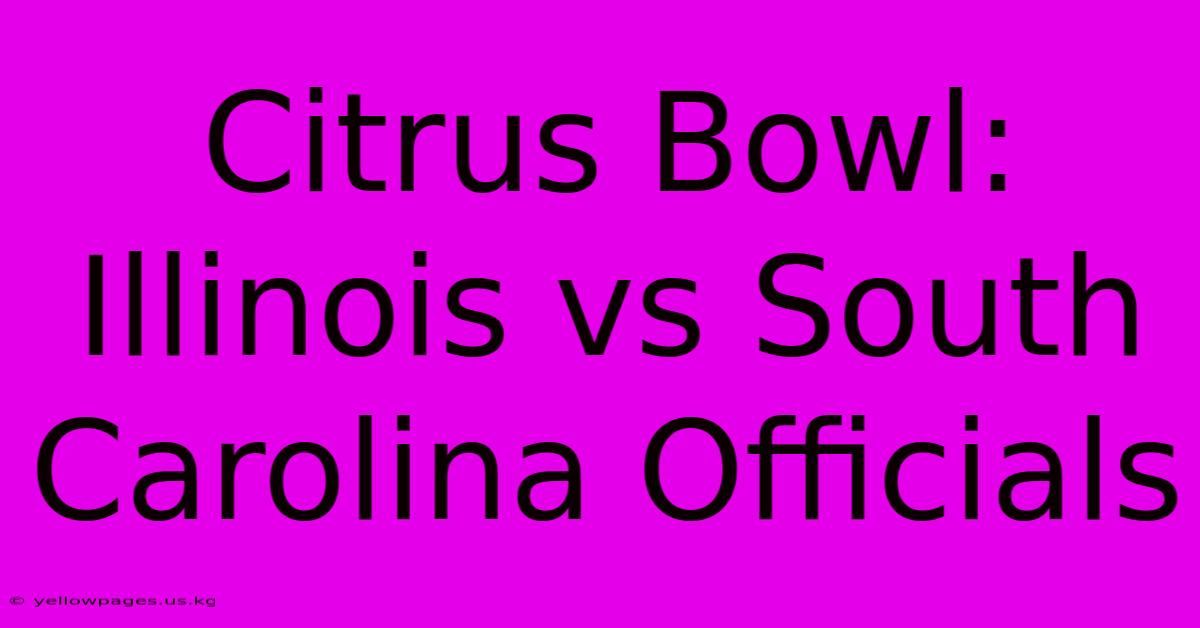Citrus Bowl: Illinois Vs South Carolina Officials

Discover more detailed and exciting information on our website. Click the link below to start your adventure: Visit Best Website trendingnews.us.kg. Don't miss out!
Table of Contents
Citrus Bowl: Illinois vs. South Carolina – Officials and Controversy
The 2023 Citrus Bowl between the Illinois Fighting Illini and the South Carolina Gamecocks was a hard-fought battle, ending in a 38-33 victory for South Carolina. While the game itself delivered plenty of excitement, the officiating crew also found themselves under intense scrutiny. This article will delve into the key officiating calls that sparked debate, examining their impact on the game's outcome and analyzing the potential for improvement in future collegiate bowl games.
Controversial Calls That Shaped the Game
Several calls made by the officiating crew during the Citrus Bowl ignited passionate discussions amongst fans and analysts alike. The most significant controversies stemmed from:
1. Targeting Penalties and Their Enforcement
Several targeting penalties were called during the game, raising questions about consistency in their application. Some argued that certain hits, while forceful, didn't meet the criteria for targeting, while others felt calls were missed. The differing interpretations led to frustration amongst both fan bases and impacted momentum shifts throughout the contest. Consistency in applying targeting rules is crucial for maintaining fairness and avoiding game-altering decisions based on subjective interpretation.
2. Holding Penalties and Offensive Pass Interference
The officiating crew's approach to holding penalties and offensive pass interference also drew criticism. Some felt that holding penalties were inconsistently called, impacting both offensive and defensive drives. Similarly, debates arose regarding what constituted offensive pass interference, with some believing calls were excessively lenient or overly strict. The perceived inconsistency in these calls directly impacted the flow of the game and contributed to the overall controversy surrounding the officiating. Clearer guidelines and more consistent enforcement are needed to ensure fair application of these rules.
3. Clock Management and Replay Reviews
Controversies also arose regarding clock management and the accuracy of replay reviews. Questions were raised about whether time was correctly managed on specific plays, and whether all replays were reviewed effectively. Such inconsistencies can significantly impact the outcome of close games, like the Citrus Bowl. Improved training for officials in clock management and the proper use of instant replay are vital for enhancing the accuracy and fairness of the game. Technology advancements can also be implemented to streamline these processes.
The Impact of Officiating on the Game's Narrative
The contentious officiating in the Citrus Bowl undoubtedly affected the game's narrative. The seemingly inconsistent calls created an environment where the focus shifted from the players' performances to the judgment calls made by the referees. This overshadowed the exceptional athleticism and strategic play demonstrated by both Illinois and South Carolina. The result was a less enjoyable viewing experience for many fans, who felt that the game's outcome was influenced more by questionable officiating than by the teams' abilities.
Calls for Improved Officiating in College Football
The 2023 Citrus Bowl highlighted the need for improvements in college football officiating. Increased transparency in explaining officiating decisions, more rigorous training for officials, and consistent application of rules are crucial to enhancing the integrity and enjoyment of the game. Exploring technological advancements, such as enhanced replay systems and improved communication between officials, could also significantly benefit the officiating process.
Conclusion: Learning from the Citrus Bowl Controversy
The officiating in the Citrus Bowl between Illinois and South Carolina served as a stark reminder of the pivotal role officials play in shaping the outcome of games. While officiating will always involve subjectivity, a greater focus on consistency, transparency, and the implementation of improved training methods and technology can ensure a more fair and enjoyable experience for players, coaches, and fans alike. The ongoing discussion surrounding these controversies should fuel improvements in officiating standards for future collegiate football games.

Thank you for visiting our website wich cover about Citrus Bowl: Illinois Vs South Carolina Officials. We hope the information provided has been useful to you. Feel free to contact us if you have any questions or need further assistance. See you next time and dont miss to bookmark.
Featured Posts
-
Kentucky Wildcats Vs Brown Bears Results
Jan 01, 2025
-
College Football Bowls New Years Eve
Jan 01, 2025
-
Uof L Defeats Washington Sun Bowl Victory
Jan 01, 2025
-
Cfp Bracket Updated Quarterfinal Games
Jan 01, 2025
-
Path To Cfp For Qbs
Jan 01, 2025
